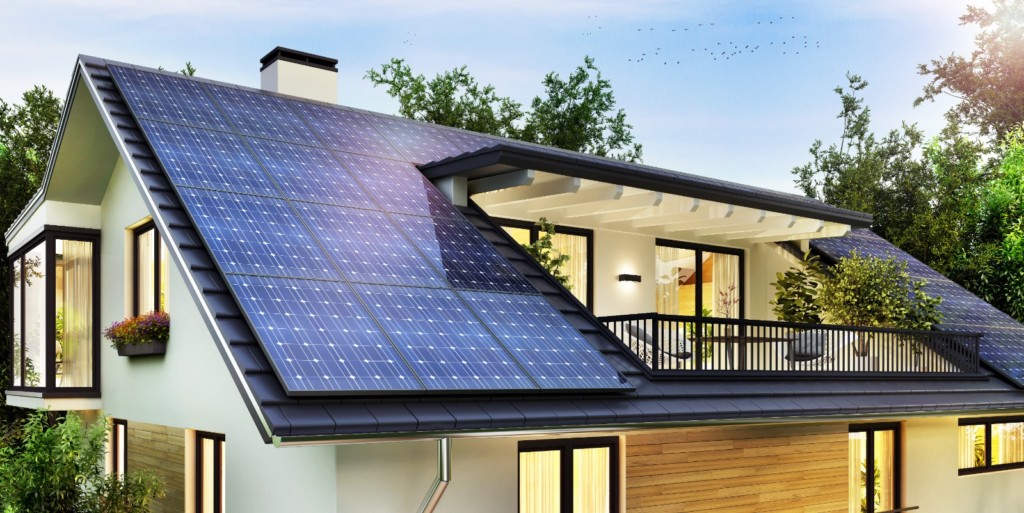- Cut your energy bills
- Protect against rising energy prices
- Increase grid independence
- Reduce your carbon footprint
Solar PV for Heating:
A Sustainable Solution for Energy Efficiency
Solar photovoltaic (PV) systems have revolutionized the way we harness and utilize energy. While solar panels are commonly associated with generating electricity, they can also be utilized for heating purposes, offering an eco-friendly and cost-effective alternative to traditional heating systems. In this article, we will explore the unique aspects and benefits of using solar PV for heating.
Solar PV Heating System

Solar PV heating systems work by converting sunlight into thermal energy, which can be used for various heating applications. These systems typically consist of solar panels, a heat transfer medium, and a heat distribution system. The solar panels capture sunlight and convert it into electricity, which is then used to heat water or air through a heat transfer medium such as a heat exchanger. The heated water or air can be utilized for space heating, domestic hot water, or other heating requirements.
One of the unique advantages of solar PV heating is its ability to provide renewable and sustainable energy. Solar power is abundant and freely available, making it an inexhaustible resource. By harnessing the sun’s energy, solar PV systems reduce reliance on fossil fuels and contribute to a significant reduction in greenhouse gas emissions. This environmentally friendly approach helps combat climate change and promotes a greener future.
Another notable benefit of solar PV heating is its potential for energy cost savings. While the initial installation cost of a solar PV system may be higher than traditional heating systems, the long-term operational costs are significantly lower. Once installed, solar PV systems require minimal maintenance and have a lifespan of 25 years or more. The savings on energy bills over the system’s lifetime can outweigh the initial investment, providing a substantial return on investment.
Solar PV heating systems also offer versatility in their applications. They can be integrated into existing heating systems or used as standalone solutions. In residential settings, solar PV can be used for water heating, space heating, and even pool heating. In commercial and industrial sectors, solar PV can contribute to heating large-scale facilities, such as warehouses or manufacturing plants. The scalability of solar PV systems makes them adaptable to various heating requirements, both small and large.
Moreover, solar PV heating systems can operate independently of the electrical grid. This feature is especially beneficial in remote areas or during power outages, where traditional heating systems may become ineffective. By utilizing solar energy, individuals and communities can achieve energy self-sufficiency, ensuring a reliable and uninterrupted heating supply.
In terms of installation, solar PV heating systems can be tailored to suit specific needs. Roof-mounted solar panels are a common choice for residential applications, while ground-mounted installations are more suitable for larger-scale projects. Additionally, advancements in technology have led to the development of innovative solar panel designs, such as building-integrated photovoltaics (BIPV) and solar thermal collectors. These advancements enable the integration of solar PV systems into architectural elements, enhancing the aesthetics of buildings while harnessing solar energy for heating.
In conclusion, solar PV heating systems offer unique advantages in terms of sustainability, cost-effectiveness, versatility, and reliability. By utilizing solar power for heating, we can reduce our carbon footprint, save on energy costs, and contribute to a cleaner and more sustainable future. With ongoing advancements in solar technology, the potential for solar PV in heating applications continues to grow, paving the way for a more efficient and environmentally conscious approach to heating.
One of the unique advantages of solar PV heating is its ability to provide renewable and sustainable energy. Solar power is abundant and freely available, making it an inexhaustible resource. By harnessing the sun’s energy, solar PV systems reduce reliance on fossil fuels and contribute to a significant reduction in greenhouse gas emissions. This environmentally friendly approach helps combat climate change and promotes a greener future.
Another notable benefit of solar PV heating is its potential for energy cost savings. While the initial installation cost of a solar PV system may be higher than traditional heating systems, the long-term operational costs are significantly lower. Once installed, solar PV systems require minimal maintenance and have a lifespan of 25 years or more. The savings on energy bills over the system’s lifetime can outweigh the initial investment, providing a substantial return on investment.
Solar PV heating systems also offer versatility in their applications. They can be integrated into existing heating systems or used as standalone solutions. In residential settings, solar PV can be used for water heating, space heating, and even pool heating. In commercial and industrial sectors, solar PV can contribute to heating large-scale facilities, such as warehouses or manufacturing plants. The scalability of solar PV systems makes them adaptable to various heating requirements, both small and large.
Moreover, solar PV heating systems can operate independently of the electrical grid. This feature is especially beneficial in remote areas or during power outages, where traditional heating systems may become ineffective. By utilizing solar energy, individuals and communities can achieve energy self-sufficiency, ensuring a reliable and uninterrupted heating supply.
In terms of installation, solar PV heating systems can be tailored to suit specific needs. Roof-mounted solar panels are a common choice for residential applications, while ground-mounted installations are more suitable for larger-scale projects. Additionally, advancements in technology have led to the development of innovative solar panel designs, such as building-integrated photovoltaics (BIPV) and solar thermal collectors. These advancements enable the integration of solar PV systems into architectural elements, enhancing the aesthetics of buildings while harnessing solar energy for heating.
In conclusion, solar PV heating systems offer unique advantages in terms of sustainability, cost-effectiveness, versatility, and reliability. By utilizing solar power for heating, we can reduce our carbon footprint, save on energy costs, and contribute to a cleaner and more sustainable future. With ongoing advancements in solar technology, the potential for solar PV in heating applications continues to grow, paving the way for a more efficient and environmentally conscious approach to heating.
Take control of your energy today
We’ve made buying solar simple. Get a fixed price in minutes using our instant solar quote tool.


